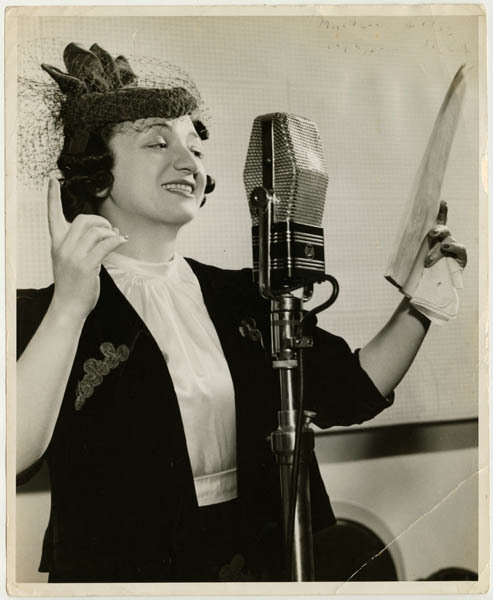We continue Sarah Ganton’s story of Molly Picon, for decades a household name in Yiddish theater and vaudeville, then a Broadway star and performer with the USO, then a radio personality. We’re very fortunate to have a rich record of her life through the archives of the American Jewish Historic Society, one of the five partners of the Center of Jewish History. Join us in celebrating this remarkable, vivacious and endlessly talented woman.

Molly Picon performing for the Maxwell House radio show, December 6, 1938. [Link]
As World War II drew to a close, Molly and Jacob began to plan a tour of Europe, especially the Displaced Persons camps in areas that had been occupied by Nazi Germany. They collected necessities and some of life’s little pleasures like lipstick and jewelry to distribute at the camps. Molly and Jacob left New York on May 9, 1946, and were the first entertainers to tour the DP camps since the war had ended.[1]
They began in Paris, where it appeared the city’s soul had been lost. Nevertheless, the French Jews turned up in droves for Molly’s performance. Molly remembers that “everyone came knowing a crucial barrier was about to fall, and it did. Although it took us twenty minutes to do it, we made these tragic Jews laugh and our hearts expanded with joy at the sound.”[2]
They continued to give concerts in France and Belgium until they finally secured visas into Poland after months of standstill. There they saw the Warsaw Ghetto, the prison camps, and the gas chambers. Heavy with emotion, they continued their shows: “We had expected the worst and we had seen it, but we had no time to cry. Yonkel and I put our emotions aside and gave thanks for the sweet balm of music.”[3] They continued in this manner throughout Poland, until their return to the United States at the end of August, 1946.[4]
Back at home in New York, Molly continued her work on the radio, which she had begun in 1938 with a show sponsored by Maxwell House coffee. Molly opened the show with a “Good shabbos” and kept her program decidedly Yiddish. “As I stand here before the microphone,” she would often begin, “I can see you all seated around your shabbos tables. Some of you are smiling and some of you are leaning close to your radios.”[5] She sometimes included a series called “I give you my life” in which she dramatized her own life story, from her childhood encounter on the streetcar to meeting her Yonkel and beyond.
She also spoke of events in her own life, such as her tour of the DP camps in Europe, and adapted many of her stage shows for the radio, including such major hits as “Yonkele,” “Oy is Dus a Leben” and “Yidl Mitn Fidl.” Yiddish theater was obviously not quite dead yet, as Molly’s radio show with its major sponsor proved. It was getting smaller and smaller, though, and Molly was getting older and older. She and her Yonkel bought a house in Mahopac, New York, christened it Chez Schmendrick after their beloved idiot of a character, and we will catch up with them there in the next post.
Sarah Ganton is a former intern at the Center for Jewish History.
__________________________________________________________
